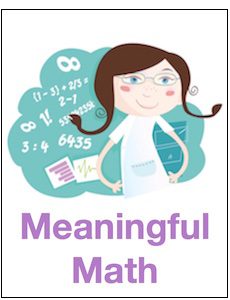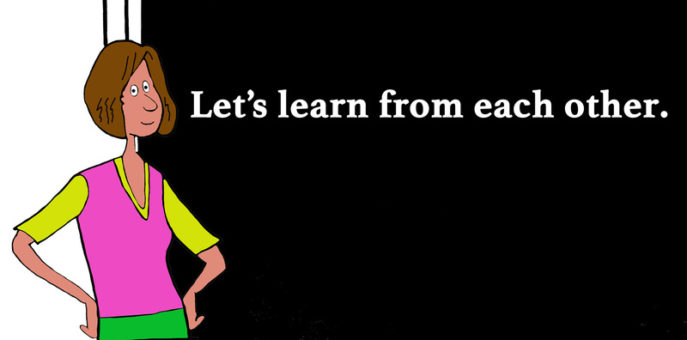How Do I Strengthen My Student Relationships?
A MiddleWeb Blog

On a personal level, I learned early in my career if my students liked me, my classroom ran more smoothly. The opposite was true as well – if students didn’t like me, it was an uphill battle. So I do think a teacher’s likeability can have a impact on the classroom.
The problem is that being likeable isn’t automatic. For me, it isn’t always easy. For instance, students often enter my class with negative feelings about math that make it harder for them to find me likeable as a person. Add to that sometimes students don’t click with me and I am unable to change their minds. But to the degree that I can, I want to be liked by my students.
Also, to me likeability is closely related to popularity. There are times I wished I was one of the popular teachers, but that’s not my personality. I get along with my students and they are generally positive toward me, but I’m a long way from popular. Even though I don’t think being popular is the right goal, I have found that being liked by my students benefits them and me. (There’s even research.)
How do I accomplish this? What can I do to strength these relationships? I thought about the times when my students found me to be encouraging, approachable, and likable. I also thought about the times throughout my career when my students became upset or frustrated with me. So what you’ll find below is my blueprint to make me more likeable to my students and to be a better teacher in general. I’ve also included some research links that helped me gain perspective.
1. Don’t frustrate students with weak teaching practices

This caused some of the students to become demoralized and made them want to give up. Of course, that resulted in them not liking me very much for awhile. So now my mantra is “students first” in regards to pacing my curriculum. Of course I have directives from my administration and I have to work within those bounds, but as far as it’s within my power I try to pace my content so that it doesn’t frustrate my learners.
2. Listen, listen, listen
Students want to feel heard. The times that students have found me unlikeable usually go back to my not listening. There were times my students did not understand what I was teaching, and they told me that. I heard what they said but I wasn’t really listening. In my mind, I thought it came down to their not trying hard enough. Now that I have more experience, I know if a lot students are telling me they don’t understand I need to listen.
It could be that I presented it in a way that just didn’t click with them, or possibly it conflicted with the way they had been taught previously. Also, they could be missing some previous skill and that was preventing them from understanding. Regardless, I have learned to listen when my instincts tell me they don’t understand.
Also, being likeable requires being willing to stop what I’m doing and listen when students want to talk. It is so hard to stop in the middle of something (especially if it’s something that you need to turn in at the end of the day) and give a student your full attention. I have a few students that regularly come into class a few minutes early so they chat with me a little and I’m training myself to stop what I’m doing and give them my full attention. It’s so easy to get tunnel vision and ignore the students who are the reason I’m here doing what I do.
3. Deepen my content knowledge
This may not seem related to likeability, but I absolutely think it is. A deep content knowledge and prior study helps me connect and communicate with students who are struggling. Many times my students have become frustrated with me because I didn’t understand what they didn’t understand.

Also, students like teachers who try to make the content interesting. We all know this isn’t always possible with every lesson, but sometimes it is. My students appreciate it when I take the time to find an interesting application or some connection to current events. To make those connections requires deeper content knowledge and extra time.
There are a lot of factors that go into student achievement, and teacher likeability is just one of them. But I want to do everything I can to help my students accomplish more, and I think there are some things I can change that will make me more likeable and improve my classroom at the same time.
A classroom where the teacher and the students like and respect each other makes for a great learning environment.
Learn more about likeability research:
What Everyone Needs to Know About High-Performance, Teacher Student Relationships from the Australian Society for Evidence Based Teaching.
What Students Think of Their Teachers Matters by Stephanie Groshell.
The Effect of Teacher Likability on Student Compliance by Theresa Z. Morgan and Angela Bergeron.


































I LOVE, LOVE, LOVE this post! Your raw honesty appeals to me. Your suggestions for getting kids to like you are super strong–especially your emphasis on starting with solid lesson plans. Kudos on a great piece!
Thank you so much for your comment! I appreciate it!
Love this post! I had already copies it to share with my administrator, and then I noticed you teach in Florence! My family is there (Muscle Shoals) and I think my cousin works for FCS! My oldest goes to UNA. What a small world! Great article! It is challenging, when we have so much we are expected to cover, to slow down and listen at times. However, the payoff is so worth it when we see the lightbulbs begin to brighten!
Thanks for your comment! Small world! You are right, trying to balance covering our content and building relationships with students seems like a no win situation sometimes. If you want to direct message me on Twitter (@michel1erussel1) we could exchange email addresses. I am curious to find out who your cousin is. Thank you again!
Thank You
Rings very true with me.
It took me 17 years to realize that I had to build relationships with my students. In my first year, I thought it was the way that I dressed. I started wearing my hair up in a bun, wearing pants, and boots. When that didn’t work, I changed the way I spoke and my personality. I mimicked the way my co-workers talked or behaved. It was obvious to students that I was not being myself. I felt like I was in competition with fellow team members who had the most well-behaved classes. When they came to my class they were not quiet and just busy. I always asked them why they were good for the other teacher but not for me. They responded that they enjoyed science in my room and the other teacher made them work all the time. It was like that for a few years and I hated it. I finally realized last year, that the relationship my coworker had with those students, did not extend to me. I had to create my own relationship with them. As a teacher leader in my school, this is one area that I will emphasize on a regular basis!